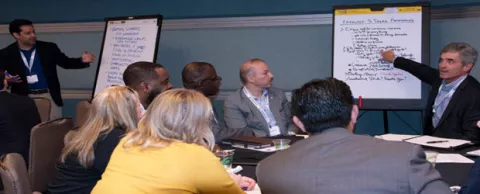
The discussions that took place at Electric Companies Advancing Cities Summit led by Council Lead Partner EEI covered a lot of ground. The point of the summit—and two more to be held later this year—is to come up with a collaborative framework in which electric companies can share their experience and expertise to help cities come up with the energy solutions that work best for them and ensure they're successful.
Our initial story on the summit covered its first five focus areas, but there also was a lot of discussion on the nuts and bolts of starting a project, paying for it, coordinating between internal and external stakeholders, project leadership and more. — Doug Peeples
Identifying and dealing with the challenges
Deciding on the "right" project for a city to take on is of critically important. However, there are many more issues involved in the planning and getting started phase. As Andy Macklin, Director of Smart City Initiatives for Portland General Electric, said breaking down silos between city departments needs to be addressed because "A lot of us are trying to solve the same problems." Other comments from participants indicated it was a common concern, that solutions were being chosen for one department when a more inclusive, expansive approach to those solutions could benefit the entire city.
That predicament underscores the importance of bringing all stakeholders to the table at the very beginning of the conversation and planning the project with a clear vision of the results you want — outcome-based planning and design.
Another recommendation: agree on a realistic starter project because a smaller project will be a more manageable format for dealing with governance issues. Smart streetlight projects were cited as one good example because they're easily scalable and typically provide significant savings because of reduced energy cost from more efficient LED lighting and less maintenance than traditional lighting requires.
And speaking of governance, who's running the show?
The summit also focused on project leadership and what form it could take. A popular recommendation was to bring in a neutral convener, a person or organization responsible for bringing all stakeholders together and keeping the project on course. Another suggestion was setting up a separate entity for the project, whether a non-profit or not.
Also, cities likely have other potential partners that would be willing to contribute expertise and resources to energy projects, such as colleges, universities and businesses. And community organizations could be useful in helping engage and educate citizens regarding the benefits of a project.
Financing issues also were high on the summit's list of priorities, as one would expect. So were standards and metrics, data and analytics, legislation and regulation, intelligent design and planning, and more. Those topics will be addressed in detail in the future summits.
Commenting on the trend toward increased electric company collaboration with cities, Bob Borzillo, VP for Smart City Business Development for Council Lead Partner Itron, said "I've seen more utility involvement in the last 12 to 14 months than in the past five years."
Doug Peeples is a Portland, Oregon-based writer specializing in technology and energy. Follow @smartccouncil on Twitter.



